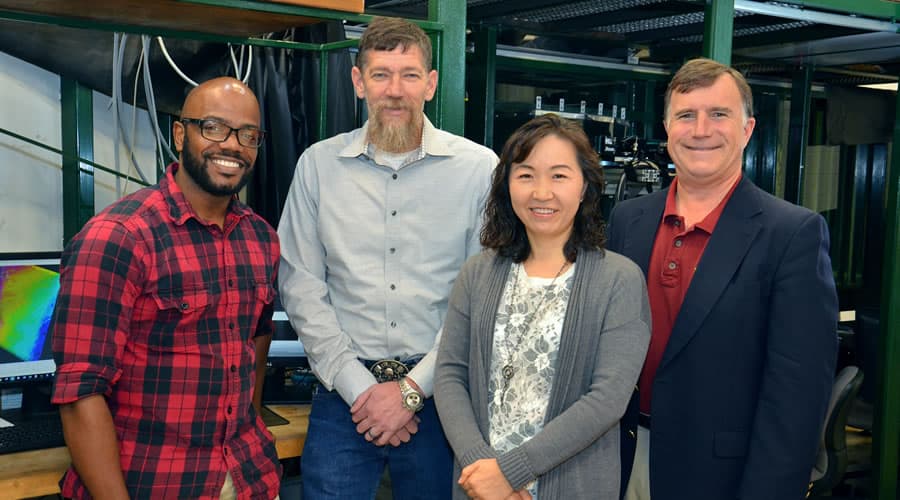
UNC Charlotte has received a $750,000 grant to help attract and support military veterans in earning graduate degrees in STEM disciplines, with particular emphasis on advanced degrees in mechanical engineering. The three-year grant, from the Office of Naval and Research Development (ONR), is designed to build on the success of a program the Lee College of Engineering operated from 2014 to 2017 that supported military veterans earning their undergraduate degrees.
This new grant is for the program, “Engaging Military Veterans to Increase Engineering Enrollment and B.S., M.S. and Ph.D. Degrees Awarded.” The program’s goal is to educate military veterans who can then work in STEM areas in support of naval research.
“We want to get veterans interested in grad school and research, which will hopefully lead them to careers as military scientists,” said Peter Tkacik, one of the principal investigators on the project and professor of mechanical engineering. “The grant will support teaching assistantship positions, which when combined with military benefits and other tuition support will make it financially possible for vets to get their graduate degrees.”
Jae Hoon Lim, an associate professor in the Cato College of Education, was one of the principal investigators on the undergraduate veteran grant and is a principal investigator on the new ONR graduate veterans grant. Her specialty is compiling information and doing statistical analysis to measure the impact of educational programs.
“One component we are looking at is the challenges veterans face and how they make the adjustments needed to be successful students,” Lim said. “They face a number of challenges on cultural levels, because they have a different set of values and expectations. One example is that in higher education you are expected to engage in critical thinking and proactively ask questions, as opposed to the military where you take orders and do as you’re told.”
A part of the first grant was the creation of the course MEGR 3090, Advanced Experimental Methods, which taught the military application of engineering. The new grant will provide funds to purchase additional lab equipment for the expansion of the course.
“MEGR 3090 has been very well received and is a huge success,” Lim said. “The learning outcomes have been outstanding. There has been excellent synergy between veterans and non-veterans in the class.”
One of the military veterans in MEGR 3090 was Jason Solomon, who is now an early entry mechanical engineering master’s student being supported by the new grant. He served in the Army Reserve from 1998 to 2008 and then started his UNC Charlotte studies in 2014.
“I was shocked at first to be around so many young students,” Solomon said. “But because of the program bringing in more veterans like myself, I was also surprised by the diversity of nontraditional students. Now, I’m getting the chance to also pursue my graduate degree, which is great.”
Another veteran who obtained a graduate degree at UNC Charlotte is Jerry Dahlberg, who recently earned a Ph.D. in Mechanical Engineering. A 21-year Army veteran, Dahlberg is one of the principal investigators on the ONR grants.
“The transition coming in from the military was rough,” Dahlberg said. “First, it was hard to get admitted to the school, then it was hard to figure out tuition, financial aid, the GI Bill, vocational rehabilitation and everything else. I had to do it all on my own, which is why I enjoy being involved in the ONR grants. I want to help others with their transition.”
Some of the impacts of the first grant included visits to 11 military and academic locations at 36 recruiting events, the publishing of 15 conference papers, and 31 job offers extended to UNC Charlotte military veterans and non-veterans in areas of naval interest from NAVAIR and Sikorsky Helicopters.
Photo, left to right, Jason Solomon, Jerry Dahlberg, Jae Hoon Lim and Peter Tkacik.